Down Syndrome – Inclusion Means Living with Possibility
“The biggest adventure you can take is to live the life of your dreams”
– Oprah Winfrey
This year’s theme for World Down Syndrome Day is about challenging the status quo by asking our society the question ‘What does inclusion mean?’. For us at Nurse Next Door Home Care Services, the answer is a simple one, that underpins our core values and mission for Making Lives Better; Inclusion Means Living with Possibility.
To raise awareness today and every day we’ve put together answers to some commonly asked questions about Down syndrome, tips on how to empower people with Down syndrome, and celebrating Australian Madeline Stuart who continuously challenges the status quo within the high fashion industry, inspiring millions of people not just here at home but around the whole world!
What is Down Syndrome?
Down syndrome is the genetic result of a person who carries an extra chromosome, also known as chromosome 21, within their DNA. This genetic sequence will determine how a baby’s body begins to form and function as it grows during pregnancy and after birth. Even though people born with Down syndrome might act and look similar to each other, each person is born with different personalities, interests, and abilities; just like every human being on this planet.
While some people with Down syndrome may experience some medical challenges such as hearing loss, developmental and intellectual challenges, sleep apnea, ear infections, eye disease, and heart defects, many continue to live long rich, and fulfilling lives through careers, families, passions, and hobbies.
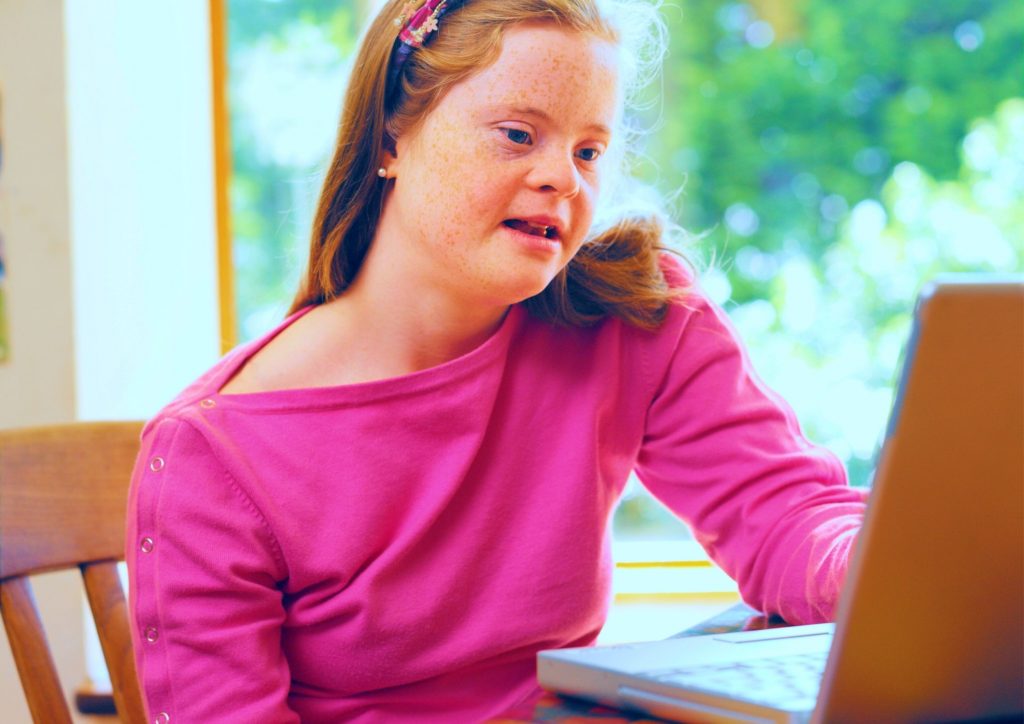
What are the Types of Down Syndrome?
To take a clinical perspective and approach for a moment; there are three types of Down Syndrome:
Trisomy 21
Trisomy 21 is the most common type, and approximately 95% of people living with Down syndrome are born with it. Each cell in the body has 3 separate copies of chromosome 21 instead of 2 copies.
Translocation Down Syndrome
Translocation Down syndrome will account for approximately 3% of people with Down syndrome. This genetic result occurs when a part or, a whole extra chromosome 21, exists but is attached or “trans-located” to a different chromosome.
Mosaic Down Syndrome
Mosaic Down syndrome accounts for approximately 2% of the people with Down syndrome. Mosaic means mixture or combination. For people with Mosaic Down syndrome, some of their cells have 3 copies of chromosome 21, but other cells have two copies of chromosome 21. People with Mosaic Down Syndrome may have fewer similarities from other types of Down syndrome that naturally result from chromosome 21, because of the presence of some (or many) cells that don’t carry chromosome 21.
While many people living with Down syndrome may have similarities to each other, every single person with Down syndrome has different talents and the ability to thrive in modern-day society.
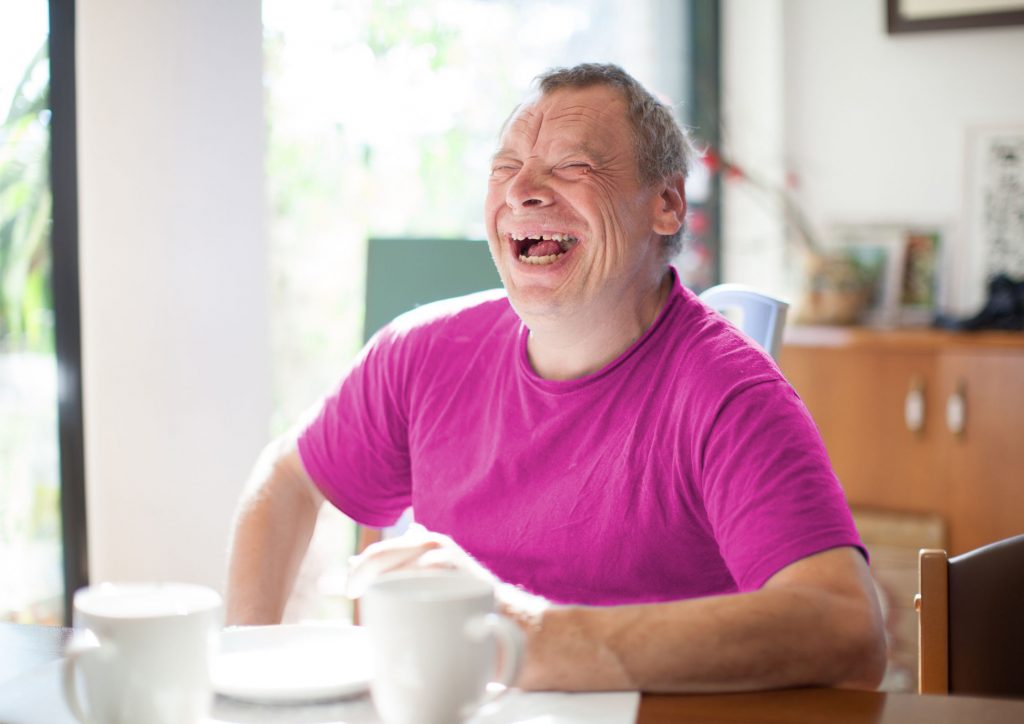
How Common is Down Syndrome in Australia?
It is estimated that approximately 1 in every 1100 babies born in Australia will have some type of Down syndrome. The probability of a woman experiencing a ‘syndrome pregnancy’ varies from 1 in 1400 for a woman 20 years of age to 1 in 30 at age 45 years.
In Australia, people living with Down syndrome are experiencing higher life expectancies each year. They are living longer and healthier lives than they have in the past due to greater awareness, support, and medical advances. The average life expectancy of people living with Down syndrome has dramatically increased over the past 50 years, with the current average life expectancy of a person living with Down syndrome in Australia being 60 years of age.
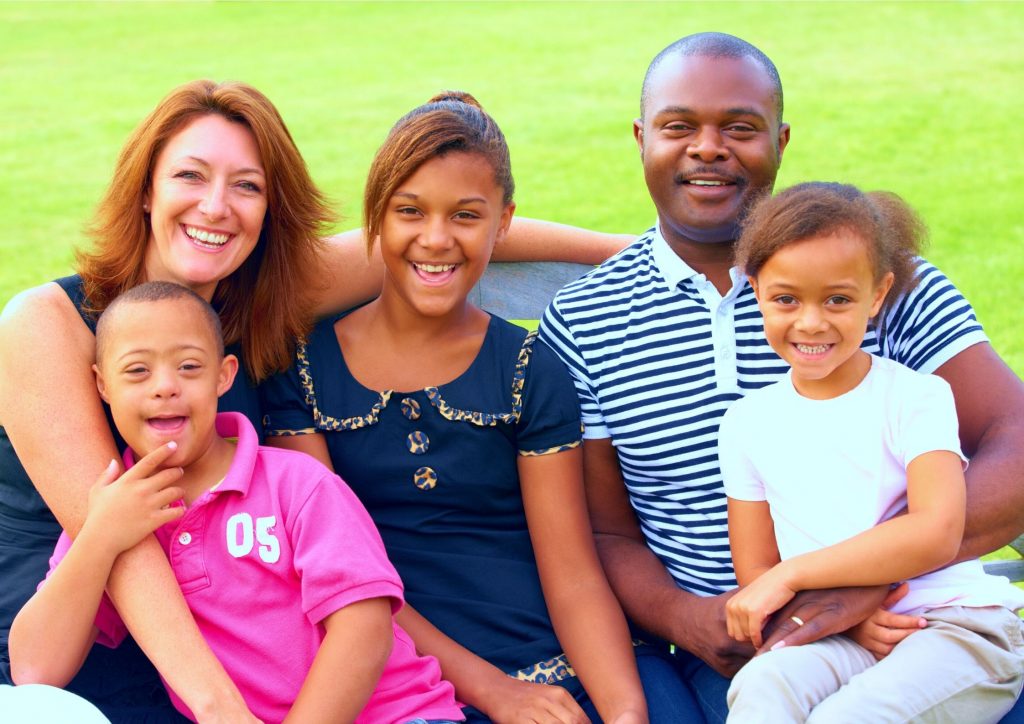
How Can You Empower People Who Have Down Syndrome?
Empowering people with Down syndrome starts with all of us, the wider society, challenging with status quo every day. To start making minor changes in your everyday life, you can follow these several simple ways to empower them:
See the Person
If you haven’t met a person with Down syndrome previously, you might feel unsure about how to best approach them during your first interaction. One key thing you remember is that people with Down syndrome are just like us.
- They all have an individual identity.
- They feel the same emotions as we do.
- They can have personal interests and hobbies.
- They can experience romantic relationships.
- They will have goals, dreams, and desires.
People with Down syndrome don’t want to be defined as someone who has an intellectual disability, but rather a person living with many abilities, skills, and talents. You don’t need to change your personal behaviour when interacting with them, just relax, be yourself and speak to them just like you would any other person you meet.
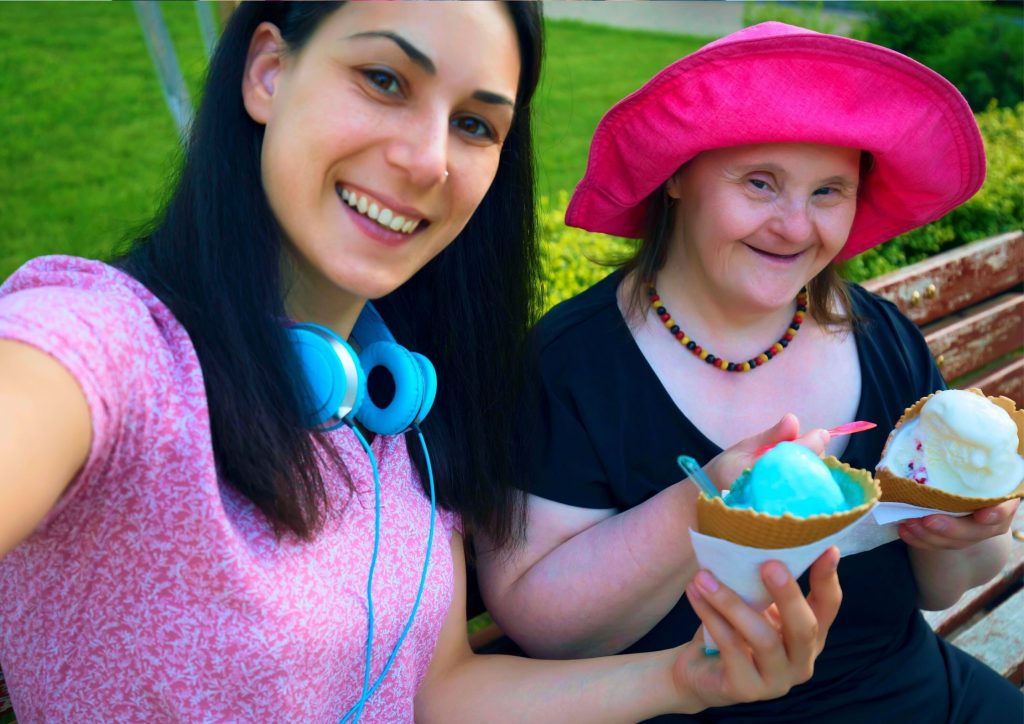
Learn About the Person
You might be unsure how you should communicate with a person who has Down syndrome. Having preconceived judgements and a lack of education has caused many people to avoid such interactions entirely. Take the time to discover more about the person living with Down Syndrome, because communication is a basic human need that we all deserve to experience.
For a person with Down syndrome, communication may pose some challenges however, quality interactions are extremely possible. Here are some tips to improve your communication skills and etiquette when interacting with a person who has Down syndrome:
- Talk about their day-to-day activities as a starting point, this helps them associate words and ideas with actual experiences they have gone through.
- If the person is younger, or still learning new words, use visual cues, facial expressions, gestures, and signs to help reinforce what you are saying. Being animated and repeating words will allow that person to feel more engaged in the conversation and further help improve their vocabulary.
- Be cheerful and approachable with your interaction. The person will sense your comforting presence and feel encouraged to interact with you more.
- Encourage productive communication by being patient, because the person may need some time to respond to your message.
Human interaction is so important for all of us, but so is respect. Observe the person’s response and if they are not in the mood to interact, respect their decision and leave them be until they are ready to strike up a conversation with you.
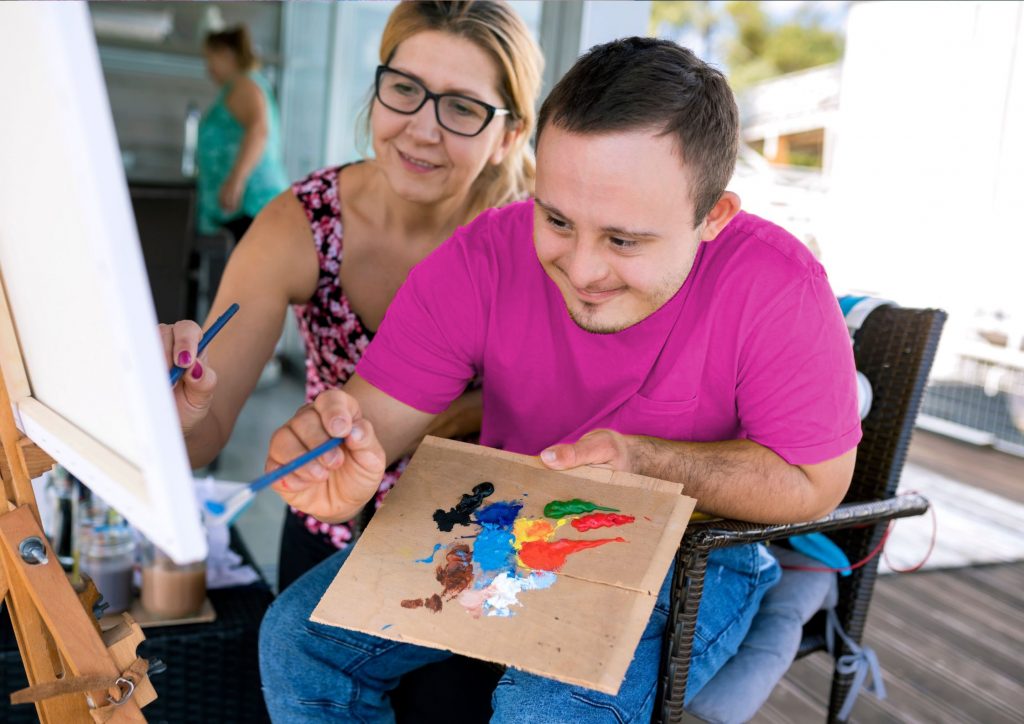
Encourage Independence For the Person
We all love living a life of independence and it’s no different for someone with Down syndrome. While they may have some dependent needs, living an independent life is extremely important to them. The best way we can empower independence for people with Down syndrome is by allowing them to make their own decisions in their day-to-day lives.
The NDIS recommends that offering supported decision-making (SDM) is the best practice approach to enhance their ability to make their own decisions. It is our responsibility to give a person with Down syndrome the individual right to make everyday decisions about their lives including:
- What to wear.
- When and what to eat and drink.
- What to do during the day.
- Who to spend time with.
- How to spend leisure time.
- When to shower and when to go to bed.
- Where to live.
- Consenting to medical and dental treatment.
- What health care they want to receive.
- How their finances are managed.
- Who and if they marry.
- Any legal matters.
Some decisions might be more challenging to make than others. We can support people with Down syndrome before they make a difficult decision by:
- Considering the risks and benefits.
- Helping them weigh up their options.
- Deferring their decision if more information is required from an expert.
While at times your support might be required to help a person with Down syndrome make a more difficult decision, this doesn’t mean that each decision they need to make will be difficult for them. Remain patient and simply let them know that you are there only if they need your direct support.
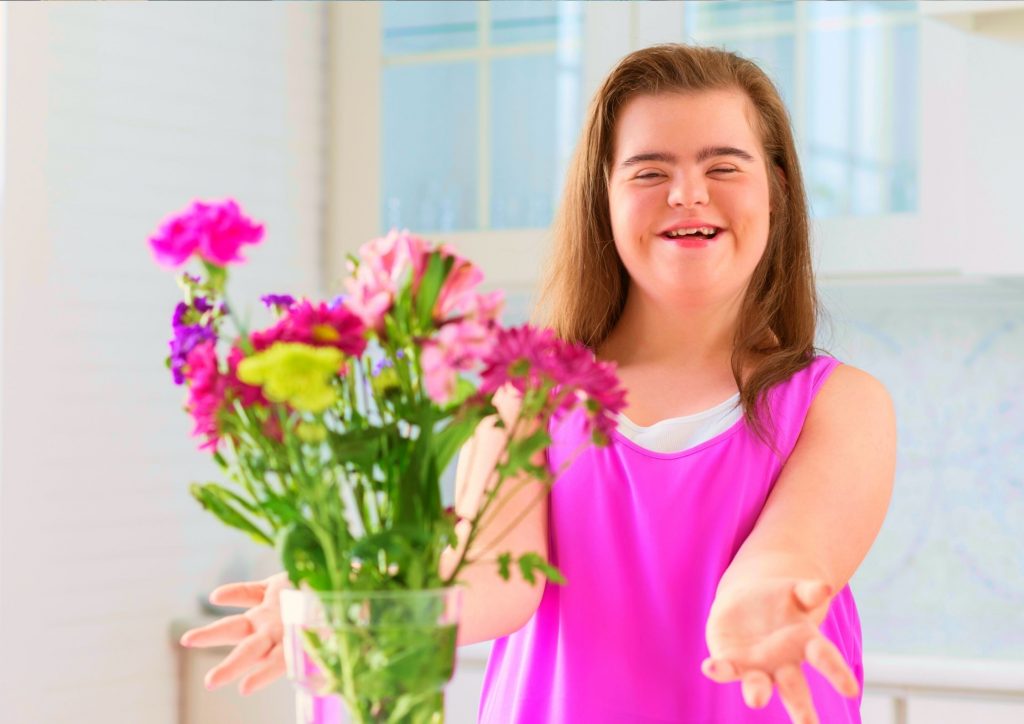
Listen to the Person’s Story
Sharing stories with one another can help us build special connections, and just like us people living with Down syndrome each have a unique story that they might be willing to share with you if they feel comfortable so you should be ready to listen.
Actively listening and engaging with a person who has Down syndrome, will encourage a sense of self-empowerment and confidence within themselves. To improve your listening skill and the overall quality of interaction with a person who has Down syndrome, you can practice active listening techniques by doing the following:
- Look at them directly.
- Show them you are listening through non-verbal reactions (eg. nodding).
- Defer any judgements you might have.
- Respond when it is appropriate.
Embracing your emotional intelligence will also help improve your overall interaction with a person who has Down syndrome. You can use the below to help further adapt your communication style:
- Encourage the person to elaborate if they are struggling to express themselves.
- Seek clarification if required.
- Accept that we are all vulnerable.
- Separate the criticisms you might hold (even if they are unintentional).
We all have a story to share, and people living with Down syndrome are no different. If they so desire to open up for you, be patient and give the person the time to express their emotions, needs, dreams, and desires. After all, we are social beings that thrive in environments where we are welcomed and accepted.
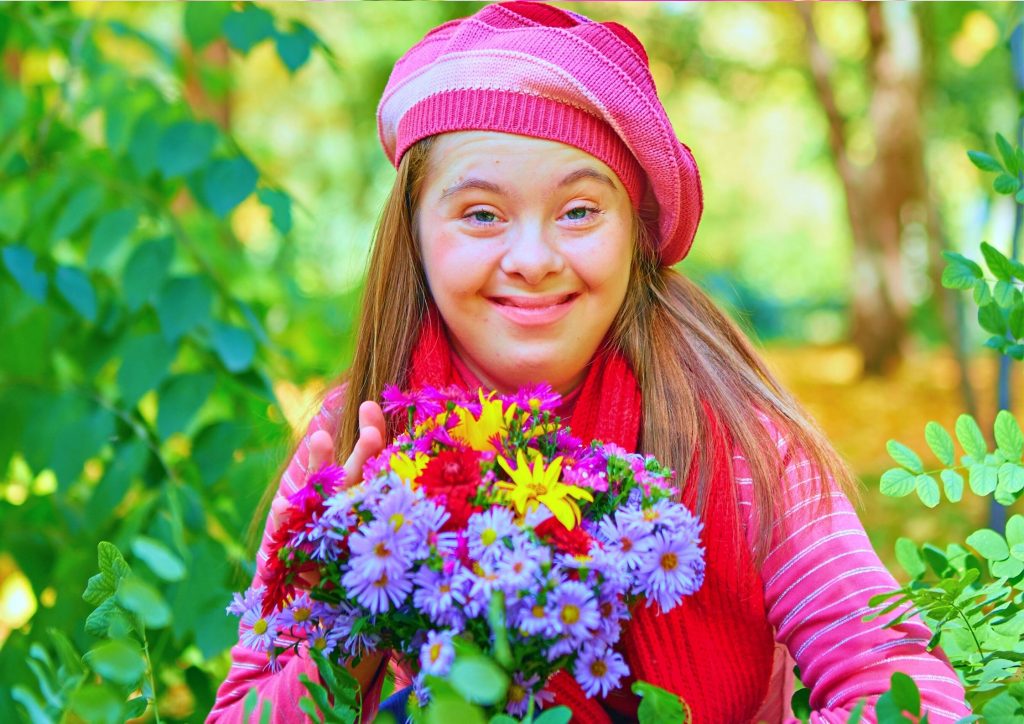
Living with Possibility- Madeline Stuart’s Story
An extremely inspiring story that has come out of Australia in recent years is the story of Madeline Stuart, a young woman who had shaken up the high fashion industry with her bravery, determination, belief, support from her family, and advocacy. Madeline is a worldwide phenomenon and unique model who started from humble beginnings in Brisbane. She has been dubbed by the press as not only a supermodel but “the world’s most famous model with Down syndrome”.
In 2015, a fashion show ignited a light within Madeline that inspired her to express these words to her mum “mum me model”. Like any mother, Rosanne wanted to fulfill her daughter’s wish and although she knew that Madeline will face many challenges ahead, this didn’t stop them from pursuing Madeline’s dream.
From the beginning, Madeline focused on her health and fitness, which her mother promoted on social media, to inspire other people that anything is possible if you set your mind to it; regardless of your ability. Madeline quickly became a sensation and went viral overnight after her photo was viewed over 6.8 million times globally. The next few days after that, Madeline hit headlines all over the globe with publications from Iceland, Germany, the US, Australia, Mexico, Cuba, and the UK.
Madeline’s career kicked off from there, and she has been actively modeling in New York, Paris, London, Dubai, and Beijing to name a few. She has also been featured in several leading publications including Vogue, Cosmopolitan, Woman’s Day, Women’s Weekly, New York Times, Elle, Marie Claire, and Cleo.
Aside from working in the high fashion industry, Madeline is also an advocate for people living with a disability or going through an illness. She has helped raise funds for a wide range of charities including Multi Cap Foundation, Endeavour Foundation Australia, Silver Linings Project, Vets Intl, The DisABILITY Museum, Melbourne City Mission, The Carol Galvin Foundation, and the Radical Beauty Project to name a few.
Currently, Madeline oversees her dance school in Brisbane, ‘Inside, Outside Dance Ensemble’, all while she balances her very busy modeling career. With other projects in the pipeline, Madeline is showing no signs of slowing down. Madeline has truly proven to so many people that the possibilities in life are endless if you build up the courage to follow your dreams.
Even though we are all born with varying abilities, as a society we should all continue to empower each other to live a life with Possibility. This is why Inclusion Matters.
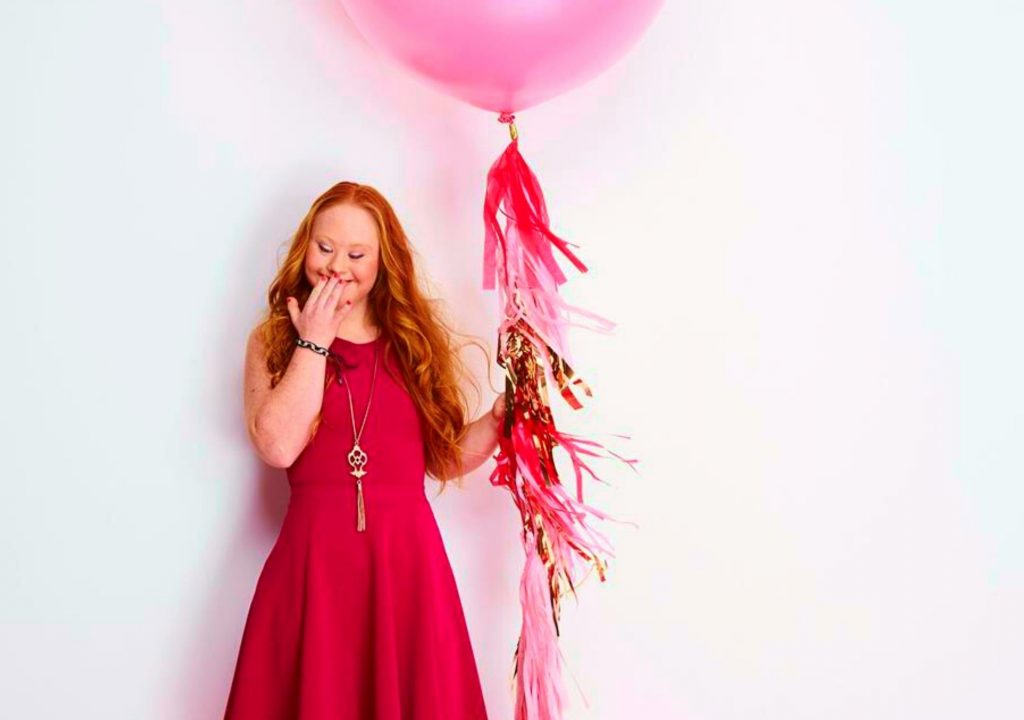
At Nurse Next Door, we are celebrating ageing and are passionate about Making Lives Better.
To learn more about The Power of Happier Ageing you can download our report
or contact us today on 1300 600 247 to discuss how Nurse Next Door can help you keep doing what you love.
